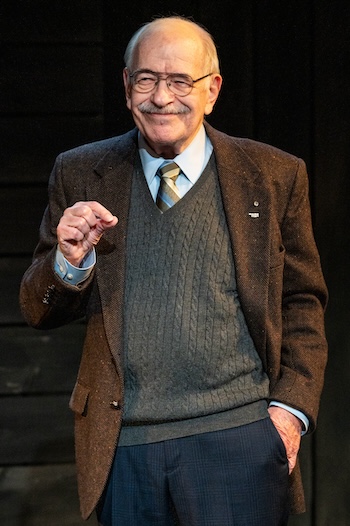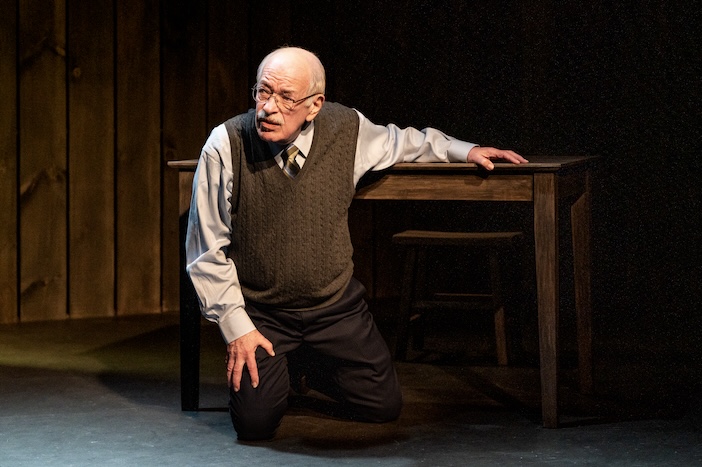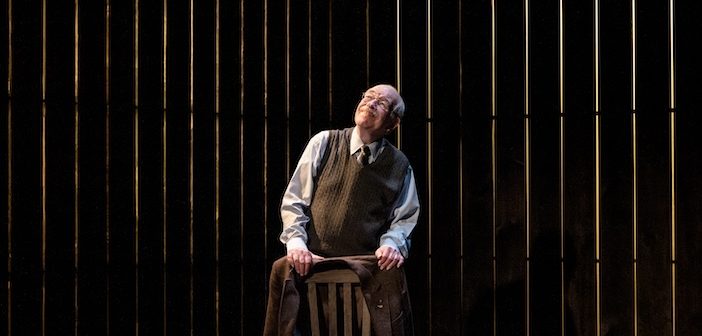The Southwark Playhouse’s declared purpose is “all about telling stories”. In that case, their decision to bring The Happiest Man on Earth over from the US was positively inspired. For this is an evening where you are being told a story as harrowing as it is uplifting, in the manner of a cosy fireside chat with your grandfather. Indeed, when Kenneth Tigar, whose one-man show this is, first steps into the theatre you wonder if he’s actually a member of the audience belatedly taking his seat. He starts to chat with those in the front row (there’s no fourth wall in this show) checking that everyone is comfortable because, as he points out, if they aren’t, there’s a lot of people in here and between us we can find a solution.
 Solution – now there’s a word in this context. The other word – final – isn’t mentioned but this is the story of a man who was a victim of that Nazi programme, who escaped from both Buchenwald and Auschwitz, who was sent on a “death march” where people froze to death – he escaped from that, too. The true story of Eddie Jaku is, indisputably, that of a survivor.
Solution – now there’s a word in this context. The other word – final – isn’t mentioned but this is the story of a man who was a victim of that Nazi programme, who escaped from both Buchenwald and Auschwitz, who was sent on a “death march” where people froze to death – he escaped from that, too. The true story of Eddie Jaku is, indisputably, that of a survivor.
Eddie Jaku’s memoir was written when he discovered his grandson hiding so he could hear a conversation about his story when an old friend. He struggled with this for a while. How much should he tell? How much could they bear to hear? In the end, he wrote it all down and his extraordinary journey became a book, then a play and even, along the way, a TED Australia talk. He died in October 2021, aged 101. His story, however, did not.
Kenneth Tigar created the part of Jaku in the original US show and it would be hard to imagine anyone else in the role. His manner is so natural, so conversational (the audience is frequently drawn in), it feels like there is no “acting” going on at all – testament to the powerful characterisation Tigar has created here. He tells of his school days and his father’s insistence on the importance of education even though it meant he had to live with a false identity to disguise his Jewishness. This education, ironically, comes back to save Jaku’s life in a concentration camp when he is identified as an “indispensable” worker despite being a Jew due to his engineering skills.
Then comes Kristalnacht, he is arrested and taken to Buchenwald. He loses his family, finds them again, they flee to Belgium, separate for safety and are eventually betrayed. There are horrifying train journeys, concentration camps, identity replaced by a tattooed number, starvation, fellow prisoners freezing to death in your shared bed. And yet.

When he is rescued by Allied Forces, having escaped from the death march, he weighs 28kg. He is gradually brought back to health, he moves to Australia, he falls in love at first sight with Flore and they are married for 75 years. He comes back – surely, almost unbelievably, after all he has seen and experienced – to having faith in humanity. Profoundly damaged by his past, he woke up to optimism and happiness again with the birth of his first son.
This is a story that is full of the most horrific side of human nature. It is also one of the most moving and inspiring you will find this side of Christmas. As Eddie says, “Never give up hope. It is never too late to be kind, polite and a loving human being.”
Miracles at Christmas don’t come better than this.
The Happiest Man on Earth runs at the Southwark Playhouse until 14th December. For more information, and for tickets, please visit www.southwarkplayhouse.co.uk.




